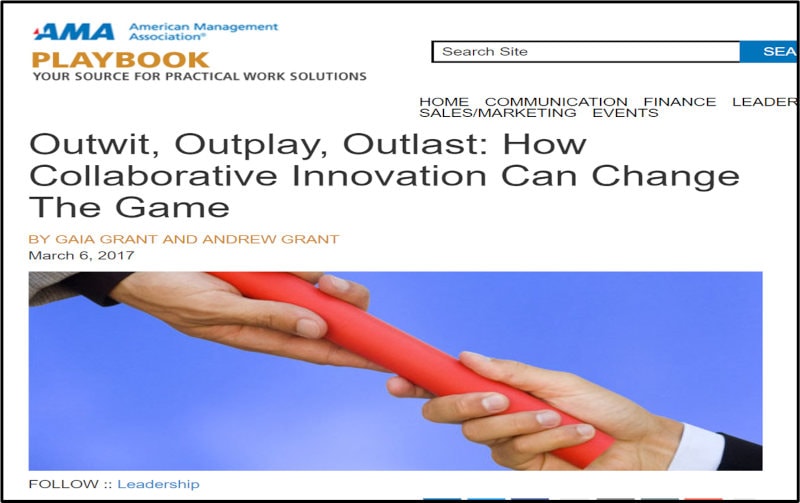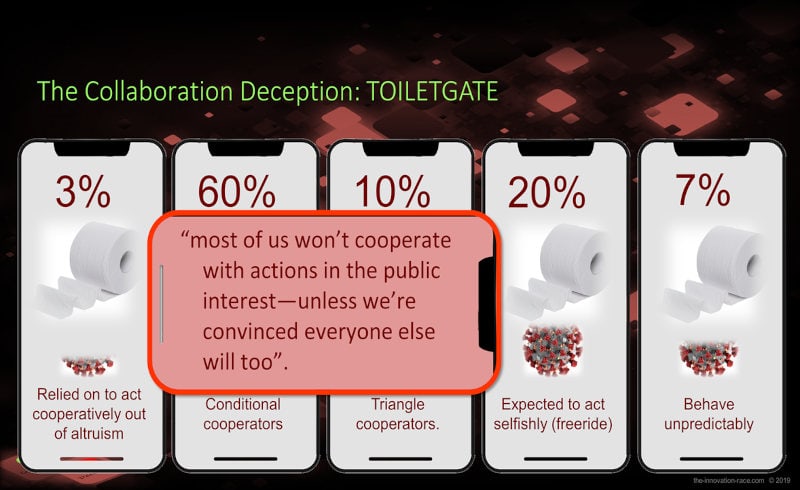COLLABORATE
The Collaboration Concept (with the Collaboration Deception simulation) is a social experiment: Building collaboration in a competitive corporate context.

Programs in this Suite

THE COLLABORATION CONCEPT Balance collaboration and competition
How to build collaboration in a competitive corporate context.SUITE: Collaborate - METHODS: Gamified simulation & Team building | Workshop | Facilitation | Keynote | Online | PLATFORMS: Face-to-Face | Blended | KEYWORDS: Collaboration, Competitiveness, Rewards, Trust, Silos, Alignment
CD1 CORE MODULES
1. Identifying collaboration and the ways the concept of collaboration can be misinterpreted, misunderstood and misused. Conflicts of interest: Does trust really make the world go around?
2. Does that which suits the individual agenda also suit the team agenda? (The $10K button experiment / The “Ultimatum Game” & other social experiments).
INTERACTIVE KEYNOTE / WEBINAR
- How many people do we trust in a day? And why its important?
- Successful innovative companies collaborate.
- Interactive ‘game theory’ explanation.
- The $10000 collaboration bell dilemma.
- Who pays for a lighthouse?

THE COLLABORATION DECEPTION simulation
Building teams and culture based on workable trust.SUITE: Collaborate – METHODS| Online : Workshop | Facilitation | Licence | Self-led | PLATFORMS: Face-to-Face | Virtual | Blended | KEY WORDS: Collaboration, Trust, Silos, Alignment
CD2 CORE MODULES
1. Game theory “WIN AS MUCH AS YOU CAN”. Face-to-face Simulation OR “THE NEGOTIATOR’S DILEMMA” Strategy Simulation: (online Harvard).
2. The tragedy of commons in the workplace & dealing with defectors
3. To the core of collaboration (debrief).
4. Finding win-wins, Reality TV is not team building. Under what conditions will people really collaborate? (behavioral economics).
INTERACTIVE SIMULATION
‘The negotiation Game’ (digital –)
Game theory social experiment simulation

IMPLICATIONS AND APPLICATIONS - What does collaboration really mean?
Using cooperation theory to develop collaborative engagement strategies.SUITE: Collaborate | Innovate - METHODS: Workshop | Facilitation | Licence | PLATFORMS: Face-to-Face | Virtual | KEY WORDS: Collaboration, Trust, Silos, Alignment, Strategy
CD3 CORE MODULES
1. How to create a culture of Collaborative Innovation. The 7 strategies to become more collaborative.
2. Designing a culture to ensure that the common interest can exceed individual differences & costs to benefits at work favour collaboration?
BIZ FACILITATION
- Collaboration
- Leadership pitfalls – Non collaborative solutions
How to win at an impossible game – options often include:
- Defect and make the others lose
- Playing ‘Tit for Tat’
- How free riders can damage a team dynamic

THE SKY IS NOT THE LIMIT
A themed team building with a twist. Journey into outer space, to understand the S.K.Y. model and collaboration among mutually dependent players.SUITE: Collaborate - METHODS: Gamified simulation & Team building | PLATFORMS: Face-to-Face | KEY WORDS: Zero-sum approaches V win/win, Individual, Team, Organization
MEMORABLE THEME
Game Theory
ADDITIONAL RESEARCH BASED ON
Behavior economics
If you can’t answer these 5 questions – you need this program
1. What happens when the right decision for the individual is the wrong one for the group?
2. How can a cooperative strategy get a foothold in an environment that is uncooperative?
3. What type of strategy can thrive in an environment where individuals freeride or defect?
4. Under what conditions can a collaborative strategy, resist invasion by a less cooperative society?
5. Would you push the red button first?
- How to really build a collaborative team in a corporate environment. An interactive in-depth online experience that looks at how to build a collaborative culture in a competitive environment.
- The Collaboration Deception is a powerful game-theory style interactive session, where the participants become involved in a social experiment and discover firsthand what happens when trust is removed from the equation.
- Leaders and teams can benefit from this program by learning how to build long-lasting trust with fellow team members, vendors, partners, & associates.
- Leaders and teams will understand what to look for in healthy teams & business relationships, and how to collaborate to avoid those that are in it for themselves (defectors).
- Going beyond simple academic, inspirational, and theoretical collaboration, research shows that there are good reasons to collaborate – and good reasons not to, so the key question that needs to be asked is, under what conditions will people collaborate?
- The advanced session focuses on 4 important feeding questions based on ‘Cooperation Theory’ exploring the paradoxes between Individualism & Group Engagement and Collaboration & Competition resulting in Collaborative Engagement.

Features + more


Andrew Grant explaining the concept of The Collaboration Deception
A CEO talking about The Collaboration Deception experience and feedback

